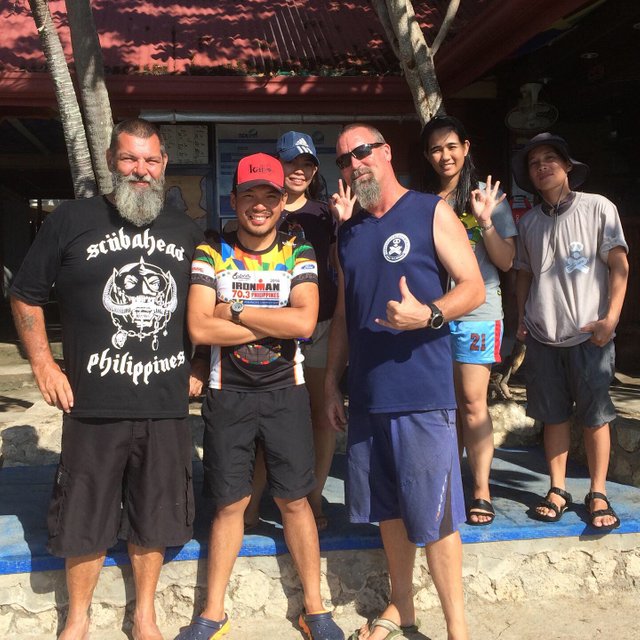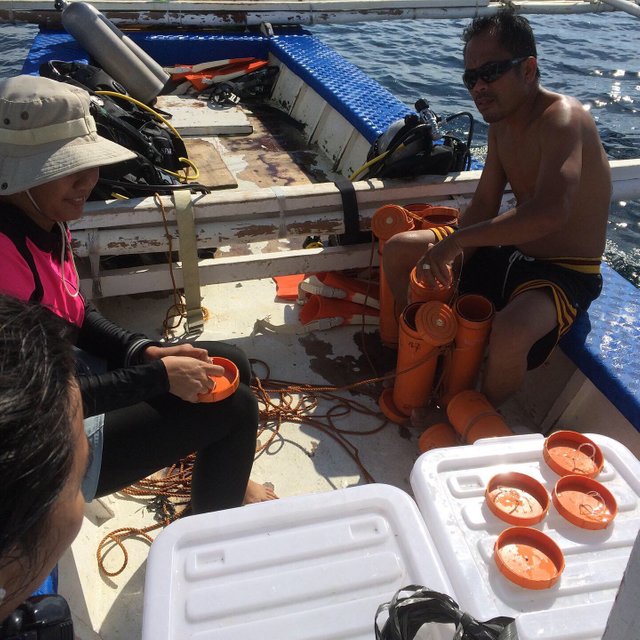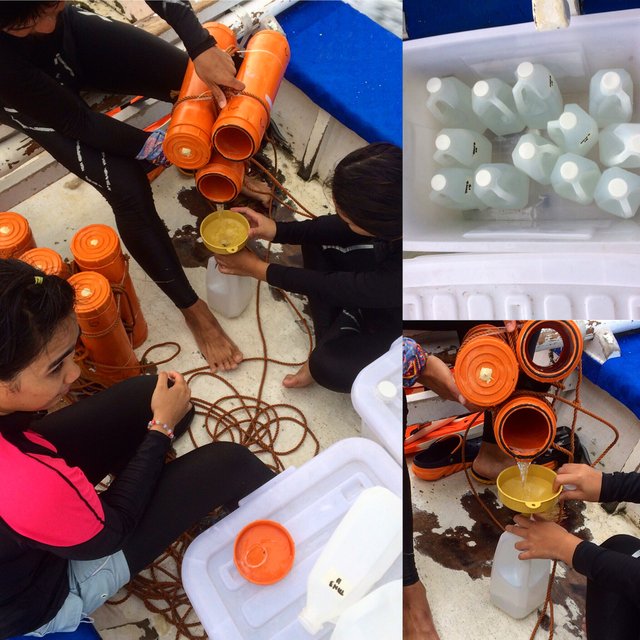TIME TO ACT - Project clean up
I thought as I spend a lot of time in the ocean I would do a piece about where I live, work and dive.
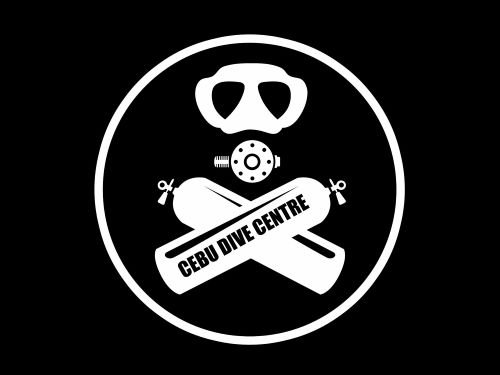
Living here in the Philippines has been a great experience, along with the wife we moved here from the UK about 3 years ago. Koz my wife is a diving instructor and I help with the day to day activities around the dive centre, generally maintenance, I also am a keen underwater photographer. Prior to living here we would come each year for a couple of months, our primary reason to dive in one of the worlds most diverse marine environments, the "Coral Triangle". This is a body or ocean covering the Philippines , Malaysia, Indonesia and Papua new Guinea, with a few smaller islands chains also included.
THE CORAL TRIANGLE.
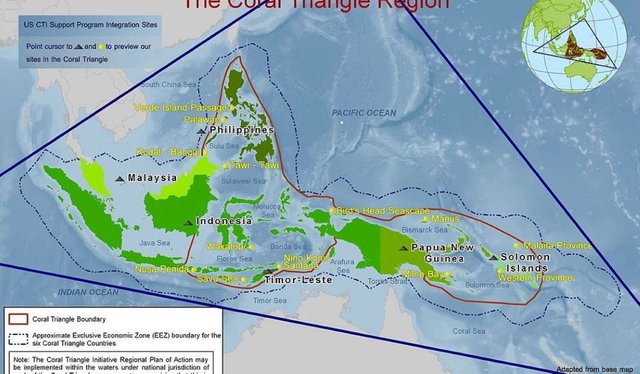
This is a relatively small area with the most biodiversity on the planet, it accounts for 1.6% of the worlds oceans but sustains 76% of corals 6000 plus species of fish and 6 of the 7 sea turtle species. Add to this the largest area of Mangrove forest on the planet, which is a breeding ground for numerous fish and sharks we can begin to see its importance. It is estimated over the next 80 years most of this could be gone, that's a scary thought. Population growth, over fishing and coastal development are some of the main factors along with climate change leading to mass coral bleaching which has led to enormous areas of reefs being lost. The balance is shifting in the wrong direction, the question is how can we reverse this. So what can we do? we can join campaign groups like; ://support.wwf.org.uk/ or any of these; https://dipndive.com/ but also on a more personal level we can be more thoughtful about how we engage with the planet. There are things we can do to not add to the problem, this is a lengthy subject but a easy one is changing the way we consume with the view to reduce waste mainly plastics which are a major contributor to ocean waste. For me this is something we can easily act on today with very little effect on how we live. Ocean debris is a big issue for me, as a diver who spends a large amount of time in the water it is a visible menace that annoys and saddens me every time I see it and unfortunately living in my part of the world unavoidable. This brings me to the main reason for this post, here in the Philippines the sea is regarded a source of income and a nation that didn't grow up on nature documentaries has yet to appreciate what a beautiful resource it has, slowly through education and engagement we are seeing a younger generation starting to understand that their future is at risk. This said there is a long way to go as the Philippines sits at number 3 on the world table of ocean polluters.
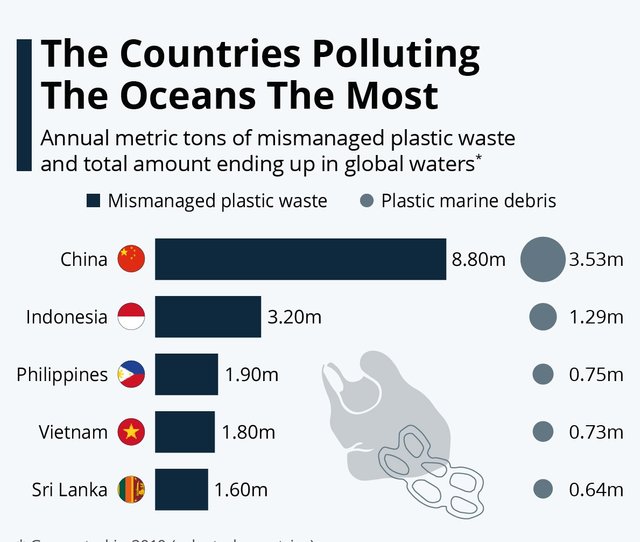
Our hope is that attitudes and behavior will change before its too late, local dive centres have got together with schools with the aim to educate the kids about how to live in a more harmonious way with their surroundings. This can work, I remember growing up in the UK in the 1970's when littering was considered quite normal, through campaigns like "keep Britain tidy" it became socially unacceptable to discard litter, its all about changing peoples attitudes which can be a hard slog but once ingrained it becomes the norm, hopefully the younger generation here will be the ones that turn this corner.
In the meantime individual actions all play a part in helping deal with the problem. Every time I dive I always try to collect a bit of waste when I see it and encourage others to do so. This can sometimes feel like a uphill struggle but if anything it slows the build up of rubbish in our small part of the world. On a near daily basis we do a walk along the foreshore and collect anything that has washed up on the tide. Plastic bottles are the most common item found, for this reason we don't sell drinks in plastic bottles and choose to give free drinking water with free refills if they have reusable containers. Also on a regular basis we have clean up dives, where we join together with other dive shops to get as many people in the water as possible and do a deep clean. We offer any customer that wants to join us a free dive for their help, getting them involved adds to their understanding of the problem and hopefully they pass on the message to others they meet along the way that single use plastics are not acceptable. Sometimes we are amazed at the quantity of rubbish we find, food wrappers, fishing line everywhere, car tyres, paint cans, nappies (diapers), the list goes on. Not all of this is thrown directly into the ocean a large part comes from in land where streams and storm drains are used as dumping grounds then during heavy rains this gets washed down into the sea.
A small example of daily finds.
Hair products.
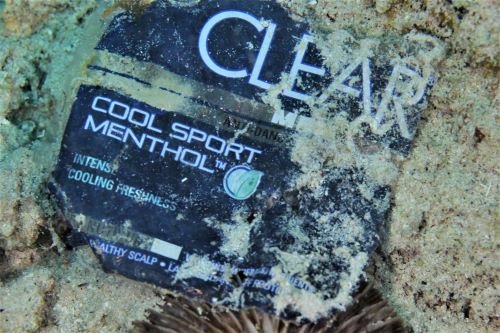
Plastic bottles.
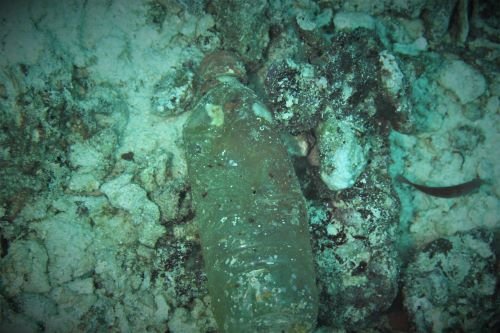
Fishing line.
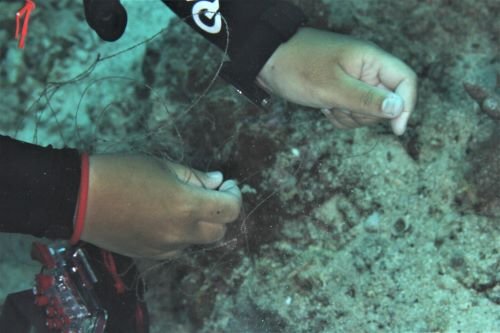
Nappies-diapers, not nice to collect!
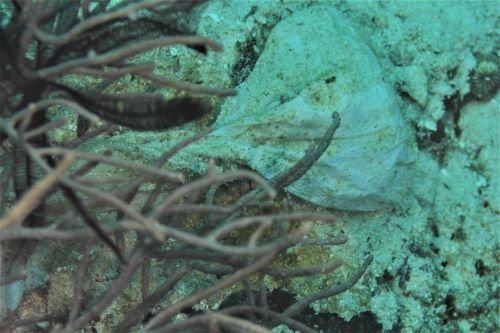
Food packaging.
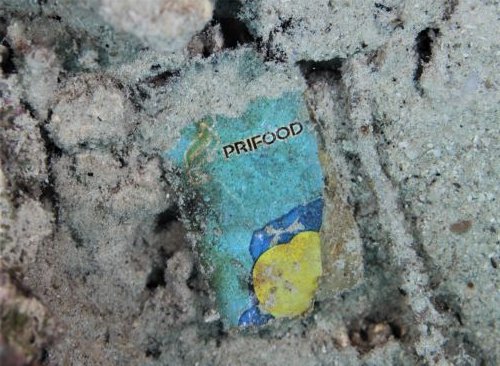
Even complete sacks of rubbish, the bag may say biodegradable but the content were not and while the sack lies on the reef it smothers and kills anything under it, nothing to "cheers" about there.
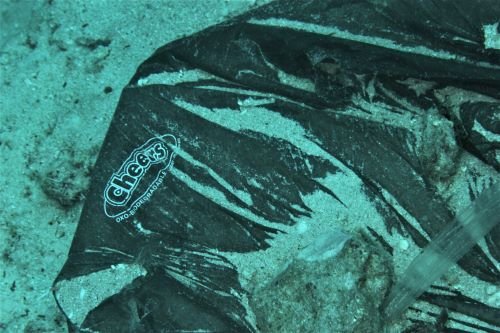
So you can see the challenge is massive, some clean ups yield 10's of kilos at a time, we sort and recycle what we can. You would have noticed in the photos that these items get covered quite easily by sand and therefore sadly much gets missed, over time things like the "biodegradable" bags (they are not) and missed items are broken down into smaller pieces which become impossible to collect. These small particles are known as micro plastics and are a huge problem, many ocean species end up consuming then during their normal feeding routine mistaking them as plankton. There is at present little information about how this affects aquatic life, we know it blocks their digestive systems which can effect their eating habits as they loose the urge to feed which in turn can stunt growth or even lead to starvation, further studies will give us more information in the near future. One thing for sure is that these micro plastics are now making their way into our food and again we have very little knowledge of the health implications for humans, more detail below;
The topic of micro plastics is being discussed much more these days and the need to understand their implications for all species ourselves included. With this in mind our dive centre (Cebu Dive Centre) teamed up with government researchers from the DENR - Department of Environment and Natural Resources. Over a 2 day period we took 100's of water samples all around the Moalboal area. This involved going out in one of our dive boats to numerous points along the coastline. Samples were taken close to shore in shallow depths to get a idea about the quality of bathing waters. Then from each point we went out using GPS to pinpoint and map our position 1.5km and 3km from the shore, at both of these distances we dropped a line which had sample tubes attached 3 at each depth, 5m, 15m and 30m. Once lowered we would dive down and close each end of the tubes ensuring that all 9 samples came up full, once back on the boat they were decanted into sterile sample bottles marked and logged for testing back at the lab. This process was repeated many times over rotating the divers who went to depth for safety reasons.
This is myself @biggypauls big beard with dive shop boss @scubahead smaller beard with the guys from DENR after a long two days of sample collecting. I should have put some sun glasses on to stop me squinting in the sun.
Samples back on board.
Decanting samples into sterile containers.
These samples have all now gone to a government laboratory for testing, this will be a massive under taking as this process is being repeated all over the Philippines a nation of some 7641 islands, so as yet we have no information on their findings but hope to be able to report later in the year. Our involvement with the DENR was a small part of their total project but just like I mentioned before a small effort in your local waters can help to make a difference. I think the point i'm trying to make is this, we can sit back and hope large organizations get their act together and sort out these problems but in all honesty many of these issues started locally and therefore who better to jump in and do their bit than the locals themselves. Not everything has to be on a national or global scale, if small numbers of proactive people get together for the better of their community, action can be taken much more quickly. If this model could become the norm from village to town to city we may see change for the better, its certainly worth the try.
Hope you enjoyed this piece, I like to when possible do something for the greater good and hope this may inspire others to do likewise, if this blog has struck a chord with you, please read the links provided throughout as they have more info.
